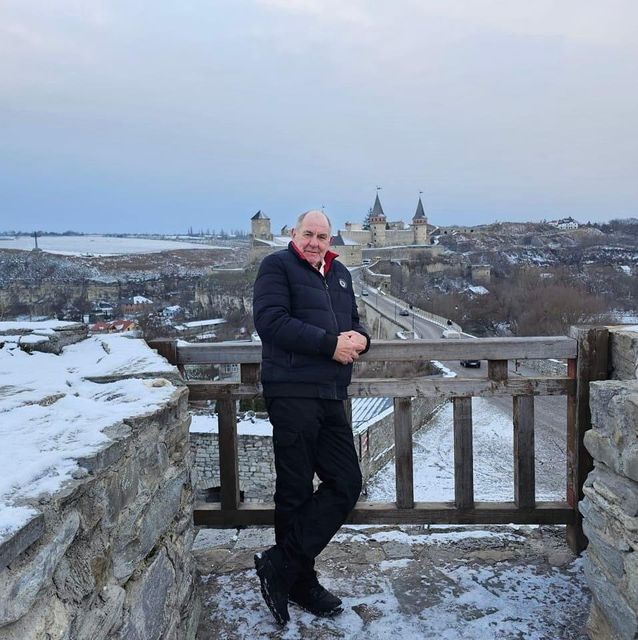A Derry man has told of how he’s “more than proud” to have organised his 300th load of humanitarian aid to Ukraine.
Peter Jennings is preparing to soon return to the war-torn country for the first time since he was almost killed in an air strike seven months ago.
Mr Jennings (67) has been arranging aid for communities since the Russians invaded in February 2022.
He started delivering by driving trucks filled with supplies from Derry to Kyiv.
Last year, Ukraine president Volodymyr Zelensky personally awarded him a medal to mark his humanitarian work.
Read more
However, his journeys were paused in May after he was thrown from his truck when the military convoy guiding him during a delivery of medical equipment in Kherson was struck by a missile.
The blast catapulted Mr Jennings — a member of the group Derry Ukraine Aid — through the windscreen of his vehicle leaving him with a shattered foot, a broken arm, damaged vertebrae, and shrapnel in his eyes, neck and back. Three soldiers from the military convoy were also killed.
With little memory of the explosion, he said he awoke in a tent being used as a makeshift military hospital.
Mr Jennings is still recovering from his injuries and admitted he will likely “be on painkillers for the rest of his life”.
However, it hasn’t stopped his work as he has just organised his 300th truckload of medical supplies and necessities which left Derry for Ukraine last Wednesday.
Peter Jennings
“I couldn’t be prouder of this lorry, it has over 20,000 nappies, 70,000 wipes, and hundreds of Christmas presents and toys for the children who have been impacted,” he said.
“The mood right now is extremely low in Ukraine, there is worry about the future and the winter.
“It’s currently below freezing and will get just worse as the winter goes on. Many people in the worst-hit areas are without power and heating.
“Anything I, and the help I’ve had from schools in the area and Waterside Presbyterian, can do to assist those there by making things more bearable is a pleasure.
“We just want to continue to help the people of Ukraine.”
Explaining his injuries, Mr Jennings told of how he has been left with a permanent limp. He is also awaiting back and shoulder surgery.
Mr Jennings remembered waking up, unsure what had happened, and asked where the “boys” — the soldiers accompanying him — were.
He recalled feeling “so guilty, I constantly feel if I wasn’t there then they wouldn’t have been either”.
Despite the incident, it hasn’t put him off going back to Ukraine.
“I’m heading there in a couple of weeks for Christmas, I can’t wait to see my family,” he said about his wife and daughters who currently live in Poland.
However, unlike his previous trips, he will be flying to Poland on December 13 and then travelling by train into Ukraine.
“Things are bad at the moment, on Thursday night there were missile strikes that hit power stations and heating stations. Putin is trying to make people suffer.”
His upcoming trip will be his last prior to the inauguration of US president-elect Donald Trump, who Mr Jennings fears will be “unpredictable” when it comes to Ukraine.
Trump has promised to stop the war on his first day back in office, though he has not provided any details on how he plans to do that.
Last Thursday, he appointed Keith Kellogg, a former national security adviser and retired lieutenant general in the US military, to be special envoy to Ukraine and Russia in his second administration.
Mr Jennings added: “Joe Biden appears to be doing everything he can to help in his last few weeks as president, which is good, but Mr Trump is very unpredictable. People are on the defensive about it, Trump has this big plan which involves talking to Putin and he thinks it’ll all be fine.
“But there is the worry he will withdraw all the aid. The Russian ruble has already dropped to less than a pound now, having crashed.
“It’s worthless, so they are starting to feel the pinch.
“This is now the third Christmas since the war broke out, and the people there are worried.
“The aid we deliver will be spread about thankfully to the worst places that are hit by the war, and it helps a little bit, especially for the most vulnerable.”
